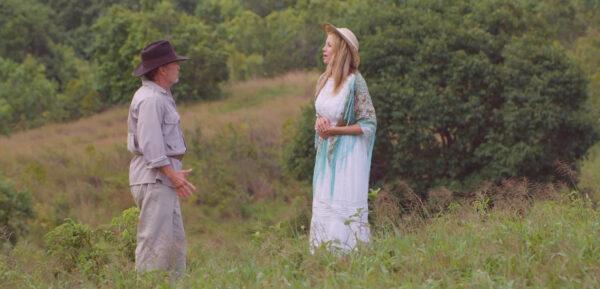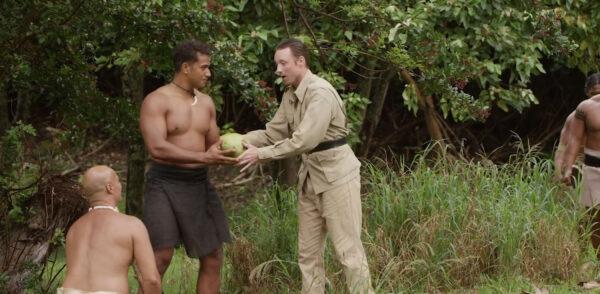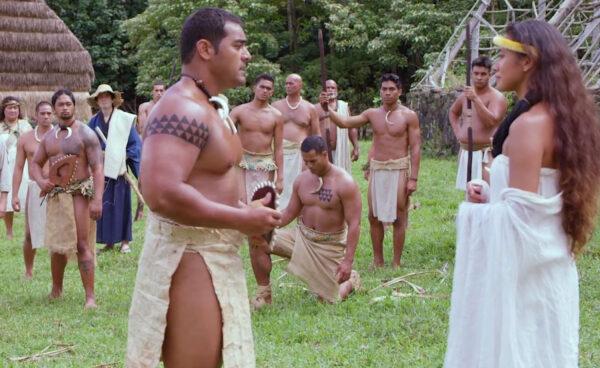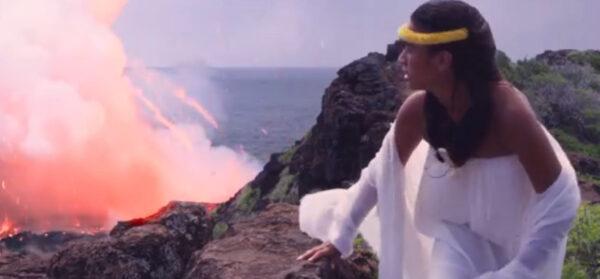PG-13 | 1h 29min | 2019
I’ve always thought Hawaii was a fascinating place, but by and large, it was glossed over in the history books presented by our American educational system. More recently, a friend of mine who is part Hawaiian and familiar with the culture, history, and traditions, enlightened me as to some of its tumultuous past, including the infamous forays into its environs by the British explorer, Captain James Cook, back in the 18th century. While I’ve tried to watch documentaries on old “Hawai'i,” I’ve found them to be about as dry and stale as one of those infamous college textbooks that used to bore me to death.
Thanks to faith-based director, Timothy Chey, there’s a 2019 biographical film called “The Islands” that couples entertaining drama with some valuable nuggets of Hawaiian history—all tied up in a great-looking cinematic package with exceptional production values.

Henry Thornton (John Savage, L) and his wife Mary (Mira Sorvino) in “The Islands” RiverRain Productions
The film begins with the arrival of a small group of missionaries who set foot on Hawaiian turf in an effort to introduce Christianity to the indigenous population. The missionaries include Henry and Mary Thornton (John Savage and Mira Sorvino, respectively), as well as Hiram Bingham (Michael Camp).
While the leader of the local Hawaiian tribe, Chieftess Kapiolani (Teuira Shanti Napa) regards the missionaries as peaceful folks who aren’t out to harm the tribe, others, including the powerful warrior Alika Kalawaia (Ricky Sua'ava) and influential tribeswoman Kanoa Palakiko (Malia Marquez), believe that the foreigners have come to their island for nefarious purposes. Indeed, as they later explain—the more resistant islanders have had bad experiences with foreign powers.

Hiram Bingham (Michael Camp, R) enjoying his time with the Hawaiians in “The Islands” RiverRain Productions
Mary Thornton isn’t exactly thrilled to be on the island, but her husband Henry is determined to guide the Hawaiians to the path of Christian divinity. While Henry and Mary quibble incessantly, Hiram has an easier time of ingratiating himself with the Hawaiians. By the film’s second act, Hiram’s gentle and humble ways begin to break through the cultural barriers—soon the missionary is surfing with the local men and sharing refreshing coconut milk with them.
But if there’s one major cultural divide that impedes the two groups’ diplomatic progress, it would have to be the Hawaiians’ tradition of human sacrifice. At certain intervals, Alika picks out one of the tribesmen to be sacrificed to Pele—a deity represented by a very active volcano in the area.
As the volcano becomes more active with every passing day, Alika tells Chieftess Kapiolani that Pele is angry at them because they’ve let the missionaries stay for as long as they have. Indeed, both Alika and Kanoa are constantly seething in the background—conspiring to kill the missionaries, or at least forcefully send them on their way—away from the island.
As Chieftess Kapiolani begins to befriend the missionaries and they, in turn, reveal their sincere desire for her to see the light and embrace Christianity, she begins to question the human sacrifices. This creates an ever-widening rift between herself and her people—principally Alika, who either strongly disagrees with her every decision, or outright ignores her orders and edicts since he believes she’s going against the authority of the tribe’s deities.
Eventually, Chieftess Kapiolani converts over to Christianity and accepts Jesus Christ as her Lord and Savior. Likewise, Mary fully embraces God and begins to see the tribe in a much more favorable light—instead of regarding them as backward “savages.”

Alika Kalawaia (Ricky Sua’ava, L) and Chieftess Kapiolani (Teuira Shanti Napa) in “The Islands” RiverRain Productions
As the rift between Chieftess Kapiolani and Alika widens, it becomes clear that things are eventually going to reach a breaking point. And that’s when the chieftess announces to her tribe that she will demonstrate her faith in God by not only going up to the top of the active volcano, Pele, but also descend into its molten interior.
Although Alika and the chieftess have had their disagreements, he warns her not to go since it has been prophesied to the tribe that she will die if she does. Armed with her newfound faith, Chieftess Kapiolani bravely disregards the warnings and begins her lengthy journey. As the tribe looks on, the chieftess disappears into the lava-spewing volcano.
One of the things that struck me about this film is that Chey presents all of the characters in a believable fashion and we can understand where many of them are coming from. For example, although Alika is a menacing warrior who almost seems as though he’ll strike the chieftess down at any moment, he is only doing what he thinks is right for the preservation of his tribe’s culture and heritage, and faithful to their deities.

Chieftess Kapiolani (Teuira Shanti Napa) demonstrates her faith in God in “The Islands” RiverRain Productions
“The Islands” is a fantastic exposé on the life of the brave Chieftess Kapiolani and should make viewers who are even remotely curious about history, or interested in researching Hawaii’s rich and turbulent past. Just be aware that there are a couple of violent scenes, so young children should probably not watch this until they are older.
Watch the full movie here.
‘The Islands’
Director: Timothy A. Chey
Stars: Teuira Shanti Napa, Mira Sorvino, Ricky Sua'ava
MPAA Rating: PG-13
Release Date: 2019
Rated: 5 stars out of 5
Follow EpochTV on social media:
Facebook: https://www.facebook.com/EpochTVus
Twitter: https://twitter.com/EpochTVus
Ian Kane is a filmmaker and author based out of Los Angeles. To learn more, visit DreamFlightEnt.com or contact him at Twitter.com/ImIanKane.






